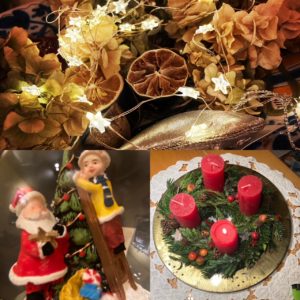Wir können zu Weihnachten nicht nur Geschenke, sondern auch Frieden schenken.
Wir können anderen Menschen eine Freude machen, indem wir etwas Nettes sagen oder ein Kompliment machen. Sie anlächeln, Ihnen helfen, etwas mit ihnen teilen: Gegenstände, Bücher, Filme, Kochrezepte. Wir können für jemanden kochen, etwas einkaufen, jemanden anrufen – vor allem dann, wenn wir wissen, dass sie oder er an Einsamkeit leidet. Wir können Tieren helfen und etwas Gutes für die Umwelt tun. Es gibt viele Möglichkeiten, Freude und Frieden zu schenken und es tut gut, liebevoll an andere zu denken, ihnen zu verzeihen, oder ihren Standpunkt anzuhören und vielleicht sogar zu verstehen. Wenn wir beginnen, anderen zu helfen und Gutes tun, spüren wir schnell: es ist gar nicht so einfach – auch helfen will gelernt sein. Wer wenig Geld hat, kann Zeit schenken. Und wenn wir eine Kettenreaktion des Guten auslösen wollen (wie Paul Watzlawick es bezeichnete), dann können wir uns angewöhnen, jeden Tag einmal Frieden zu schenken. Und vielleicht versuchen wir in der nächsten Woche zweimal Frieden zu schenken. Und mit der Zeit wird es ganz normal, friedlich zu denken und friedlich zu handeln. In der Folge werden wir sehen, dass auch andere Frieden schenken und je mehr ehrliche Freundlichkeit wir kultivieren, desto mehr Frieden wird sich auf der Welt ausbreiten.
Es gibt natürlich auch Geschenke, mit denen wir Frieden schenken können. Meine Bücher (links siehe unten) eignen sich als Friedensgeschenke, und es gibt noch einige CDs mit Friedensliedern, die man nicht nur gut hören, sondern auch singen kann (auch alleine). Der Erlös der Friedens-CDs kommt unserem Verein “Frieden macht Schule e.V.” zu Gute, sowie jeweils 1 € von jedem meiner Bücher. Wir freuen uns natürlich auch über Spenden für den Frieden (IBAN: DE14 7015 0000 1001083276).
Ich verschenke jetzt Frieden mit YouTube Videos. Das erste davon können Sie heute bereits sehen: https://www.youtube.com/watch?v=IeAHOXqp2is
Mit diesem Angebot können sich Interessierte kostenlos über praktisches psychologisches Wissen und meine Erfahrung informieren: z.B. wie man seine Gesundheit unterstützen kann, wertschätzendes Miteinander aufbaut oder sich immer wieder, trotz mancher Frustration, gut fühlen kann. Und ich unterstütze gern auch andere in unserem Netzwerk beim Aufbau von friedlichem und wertschätzendem Miteinander.
In diesem Sinne wünsche ich uns allen eine schöne friedliche Adventszeit und die Hoffnung und Zuversicht, in Zukunft noch besser miteinander zu leben.
Gertrud Müller
(Englische Version folgt in Kürze)
Links für Bücher
Machtspiele waren gestern https://shop.kastner.de/buecher/wissenschaft-forschung/3865/machtspiele-waren-gestern
Verletzte und Befreite Gefühle https://shop.kastner.de/buecher/medizin-gesundheit/3856/vorteilspack-verletzte-gefuehle-befreite-gefuehle?number=KA753
Was ist S(s)chuld? https://www.lit-verlag.de/publikationen/paedagogik/68202/was-ist-s-s-chuld
Nicki und der Leuchtturm. Ein Friedensmärchen https://www.literareon.de/catalog/book/41762
CDs bitte per email anfordern info@tools4life.eu
Channel für You Tube https://www.youtube.com/watch?v=IeAHOXqp2is
Hier noch ein Photo, das man sich gar nicht mehr vorstellen kann
Es war einmal… Christkindlmarkt

Giving peace
We can not only give gifts for Christmas, we can also give peace. We can treat others, can be kind, can pay a compliment. Others are happy when we smile, when we help them, when we do something for them, when we share, be it objects, books, films, recipes. We can lend things, we can share things – although it doesn’t have to be the toothbrush. We can help others, cook for someone, shop for the neighbours, give someone a call, especially when we know that he or she is lonely. We can help animals or do something positive for the environment.
When we begin to help others and to do good, we can quickly feel that it isn’t easy and even helping needs to be learned. There are many opportunities for giving peace, it also feels good to think of others lovingly, to forgive, to try to listen to the other point of view. If money is in short supply, time can be given. And if we want to start a chain reaction of the good, as Paul Watzlawick called it, we can make it a habit to give peace once every day, and maybe next week we can already give peace twice and over time, it will become normal to think and act peacefully.
As a result, we will see that others also give peace and the more we cultivate kindness, the more peace will grow in this world.
Of course, there are also physical gifts that are suitable for giving peace. The books I have written are suitable gifts of peace. I am including links below. We also have few CDs with peaceful songs left, you can sing along to them even on your own. The CDs are available to order from me. All proceeds from the peace CDs, as well as 1 Euro from each of my books, go to our charity Frieden macht Schule e.V. We also welcome donations for peace. The account number is as follows:
DE14 7015 0000 1001083276
Personally, I want to give more peace by recording YouTube videos. The first video is already available on my channel. On this channel, anyone interested can find information on practical psychological knowledge and my experience, for example how to support your health, build respectful relationships, and feel good despite many a frustration. I am also happy to support others in our network with growing peace and building respectful relationships.
I am wishing us all a lovely advent and the hope and confidence that we will be able to live together even better in future.
Gertrud Müller
Links:
Machtspiele waren gestern https://shop.kastner.de/buecher/wissenschaft-forschung/3865/machtspiele-waren-gestern
Verletzte und Befreite Gefühle https://shop.kastner.de/buecher/medizin-gesundheit/3856/vorteilspack-verletzte-gefuehle-befreite-gefuehle?number=KA753
Was ist S(s)chuld? https://www.lit-verlag.de/publikationen/paedagogik/68202/was-ist-s-s-chuld
Nicki und der Leuchtturm. Ein Friedensmärchen https://www.literareon.de/catalog/book/41762
CDs bitte per email anfordern info@tools4life.eu
Channel für You Tube https://www.youtube.com/watch?v=IeAHOXqp2is
Hier noch ein Photo, das man sich gar nicht mehr vorstellen kann
Once it was… Christkindlmarket






